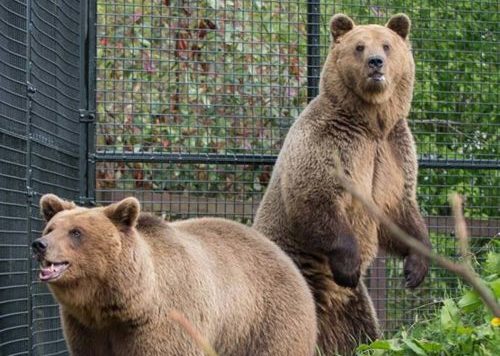Climate change is so severe that hibernating bears woke up 2 months early
Zoo employees in Moscow, Russia, began watching bears in February and found that their circadian rhythms were much more active than normal. Right in March, these bears will escape from hibernation - a phenomenon that many zoologists must pay attention to when hibernation cycles in bears often end in April each year.
The reason for this was the researchers determined by the average temperature of the Earth has increased in recent years. Last winter was considered one of the hottest winters in human history.

Bears at zoos or in the wild are all about to wake up earlier than usual.
Notably, the situation of bears ending hibernation cycles earlier than usual was also recorded in many other areas in Russia as well as some other countries.
In Voronezh Province (Russia), a brown bear resident in the Masha city zoo wakes up a month before the scheduled trip. Zoo staff noticed that the hibernation state had an unusual change based on the sensitivity of the bear to light and sound.
The same thing happened to the two brown bears at the Korkesaari Zoo in Helsinki (Finland). They even woke up in mid-February this year after only two months of hibernation.

Bears awaken suddenly during hibernation.
In New Hampshire, bear researchers said they had seen bears many times in early February of this year. In this area, last winter there was less snow and higher temperatures than usual. In other areas, the winter is so warm that bears don't even want to hibernate.
Depending on the species, a bear hibernates every year for about five months, some of which can last up to eight months. Bears will begin to hibernate when the outdoor temperature drops below at least 10 degrees Celsius. As the weather gets warmer in the late spring, the bears will begin to wake up in search of food for light meals.

Bear burrowing to prepare for shelter through the winter.
Hibernation is a mechanism used by many animals to help them survive extreme cold weather. During the winter months, temperatures drop, food is scarce and survival is especially difficult for wildlife.
The hibernation's metabolism, breathing and heart rate slow down and their temperature drops, which helps conserve energy.
Mammals, such as bears that enter hibernation, must store large amounts of fat by eating a lot in the weeks preceding hibernation. This layer of fat allows them to survive for a long time.
Early awakening will make it difficult for bears to be forced to survive during a harsh winter or two. Although the weather is warmer, the food source is still extremely scarce. Frozen rivers and lakes and withered trees under the cold cut off supplies of fish and food, the two main types of food that bears help survive.
You should read it
- ★ Tips to 'reset' the sleep cycle to get the most scientific timetable
- ★ 9 facts about body temperature anyone should know
- ★ Robot Boys help measure the impact of climate change
- ★ A global temperature increase of only half a degree may cause 5 million people to lose their homes
- ★ You will be startled when watching the video describing the process of Earth's hotness in the past 100 years